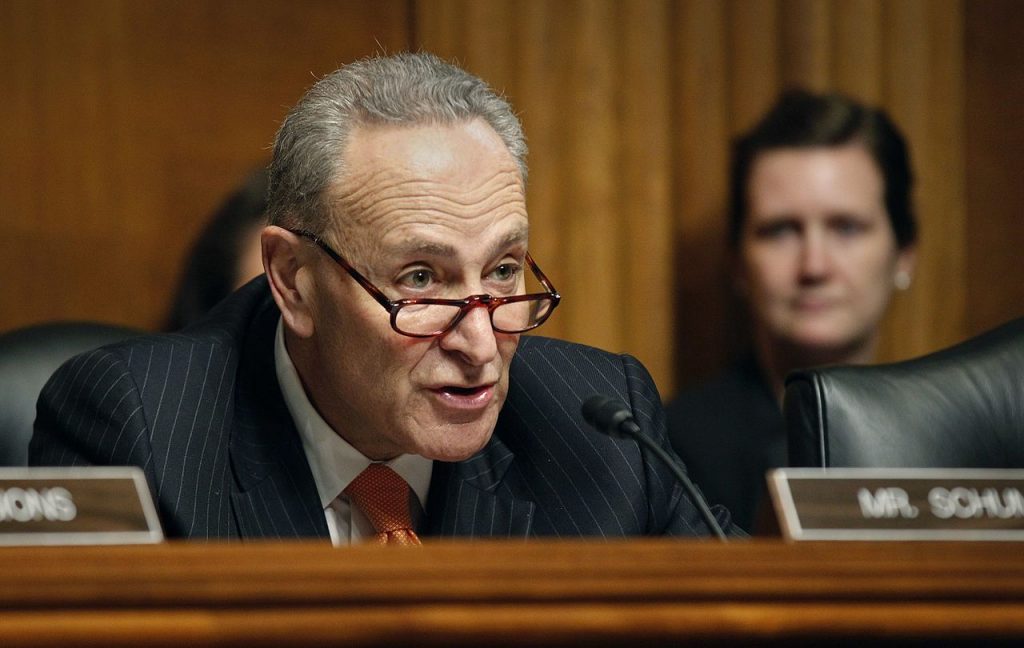
Marijuana has been illegal at the federal level since the 1970 passage of the Controlled Substances Act. Public opinion has dramatically shifted over those 48 years, to the point where recent polls have found that nearly 2/3 of Americans support legalizing marijuana.
However, while public opinion has shifted, federal law remains unchanged, and the fight over marijuana legalization has largely shifted to the states.
Now, however, New York Democrat and Senate Minority Leader Chuck Schumer has introduced the Marijuana Freedom and Opportunity Act, which would decriminalize marijuana at the federal level, among other provisions.
The bill is almost certainly not going to become law. But the very fact of its introduction is a powerful signal of just how the debate over marijuana has changed in recent years.
The Current Legal Status of Marijuana
After a series of other attempts to control the production, distribution and use of marijuana, Congress moved in 1970 to pass the Controlled Substances Act, which established national policy regulating a massive range of drugs, including marijuana.
The CSA set up five “schedules” – schedule I through V – to classify narcotics. Marijuana, infamously, was placed in schedule I, alongside heroin.
Contrary to popular perception, the schedules aren’t rankings of the danger of specific drugs. The fact that marijuana and heroin are in schedule I does not mean that the federal government believes marijuana and heroin are equally dangerous. Furthermore, the fact that marijuana is in schedule I while methamphetamine and cocaine are in schedule II doesn’t mean that meth and cocaine are considered less dangerous than marijuana.
Instead, the schedules are based on two factors: the drug’s potential for legitimate medical use and potential for abuse. Drugs in schedule I are deemed to have no legitimate medical use and high potential for abuse. Marijuana’s inclusion in that schedule remains highly controversial, though all attempts to re-schedule it have failed.
However, marijuana has been legalized in nine states: Alaska, Washington, Oregon, California, Colorado, Massachusetts, Vermont and Maine, plus the District of Columbia. Medical marijuana is legal in many other states. 13 other states have decriminalized the possession of small amounts of marijuana while retaining penalties for trafficking and sales.
The effect of marijuana legalization in these states is a matter of some dispute. But when Colorado and Washington state first legalized recreational marijuana, the predictions of opponents were dire. And few people who visit Seattle or Denver walk away thinking those cities are drug-blasted wastelands. As a result of those relatively successful experiments, even establishment figures are re-thinking the wisdom of marijuana prohibition.
What Schumer’s Bill Would Do
Senator Schumer’s bill, which was co-sponsored by Senators Bernie Sanders (I-VT), Tammy Duckworth (D-IL) and Tim Kaine (D-VA), would remove marijuana from the list of scheduled substances in the CSA.
The bill would also:
- Give states the ability to set their own marijuana policies
- Provide funding to the National Highway Traffic Safety Administration and Department of Health and Human Services to conduct research on the effects of marijuana in those departments’ fields
- Provide marijuana tax revenue to the Small Business Administration so the SBA could provide funding to marijuana businesses owned by women or minorities
The Political Path Forward
The Marijuana Freedom and Opportunity Act is not likely going to become law – certainly not this year, and almost certainly not next year, regardless of the makeup of the new Congress.
But that doesn’t mean the bill is meaningless. In fact, its introduction represents an important moment in marijuana’s legal history.
Senator Schumer is not an obscure, backbench politician – he’s the highest ranking Democrat in the Senate. And Senator Schumer isn’t an ideologue or a risk taker – he is, in fact, a savvy politician and a traditional establishment politician from the New York Democratic Party.
At this point in an election year, politicians don’t really introduce major legislation in attempt to make new law. Most of these bills are about messaging for the upcoming elections. Democrats are desperate to re-take the House of Representatives and have a good shot at doing so. At the same time, Senate Democrats are largely playing defense, trying to hold on to seats in deep red states like North Dakota, Indiana and West Virginia.
That a politician like Chuck Schumer is introducing a bill to de-criminalize marijuana at this point in an election is a striking illustration of just how the politics around marijuana have changed. There’s no way Senator Schumer would introduce a bill with no chance of passing if he thought it would endanger his party’s electoral chances.
The fate of the MFOA in a new Congress is questionable, even if Democrats control one or both houses in 2019. It would be difficult to find 51 Senators to support such a bill, and even if those Senators are found, it’s unlikely a Republican president running under a “law and order” banner would sign the bill into law.
However, the President’s policy views and decision making are famously unpredictable, and there’s no foreseeing how a White House desperate to position itself for re-election in 2020 would respond to a bill with strong public support. If Democrats seize control of Congress in the midterms, some marijuana legislation is likely to emerge.
